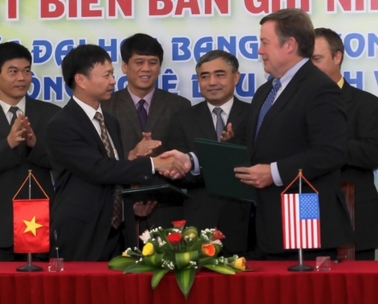 In an effort to bolster Arizona State University’s existing partnerships and mission to help advance education in Vietnam, university officials and President Michael Crow recently traveled to the country to meet with local officials, evaluate their progress and discuss further possible action.
In an effort to bolster Arizona State University’s existing partnerships and mission to help advance education in Vietnam, university officials and President Michael Crow recently traveled to the country to meet with local officials, evaluate their progress and discuss further possible action.
While in Vietnam, Crow met with Hoang Minh, president of the Posts and Telecommunications Institute of Technology (PTIT), to sign a five-year memorandum of understanding (MOU) on collaboration between the two institutions.
As part of the memorandum, the institutions will work together to improve teaching methods in Vietnam through a jointly hosted conference in Hanoi; a short training course on cyber security at ASU; the establishment of a joint master’s of science program; and the development of a new learning management system.
“We are convinced that (this memorandum) will help PTIT advance modern instructional approaches and curricula to improve the learning outcome of PTIT’s exclusive information and network security students,” said Minh.
“ASU already has participated in some collaborative programs to advance Vietnamese education,” Crow said. “Through this MOU, we are happy to support PTIT and enhance their student’s learning outcomes.”
In addition to the partnership with PTIT, ASU has been working with Vietnam’s Ministry of Education and Training and other partners, including USAID and Intel, on other long-term programs, namely the Higher Engineering Education Alliance Program (HEEAP). The program began in 2010 with the involvement of five of Vietnam’s top technical universities, and in 2011 expanded to include three vocational colleges.
During the recent visit, a reception was held to celebrate the partnership’s extension to 2017 The reception marked the achievements gained during the program implementation; and according to ASU professor and director of HEEAP Jeffrey Goss, there are several.
Already, some 219 lecturers from HEEAP universities have been trained in the U.S. and are working on projects to transform engineering education. In addition, a program for female students’ interests in technical fields has provided 600 female vocational college students with scholarships from the program.

